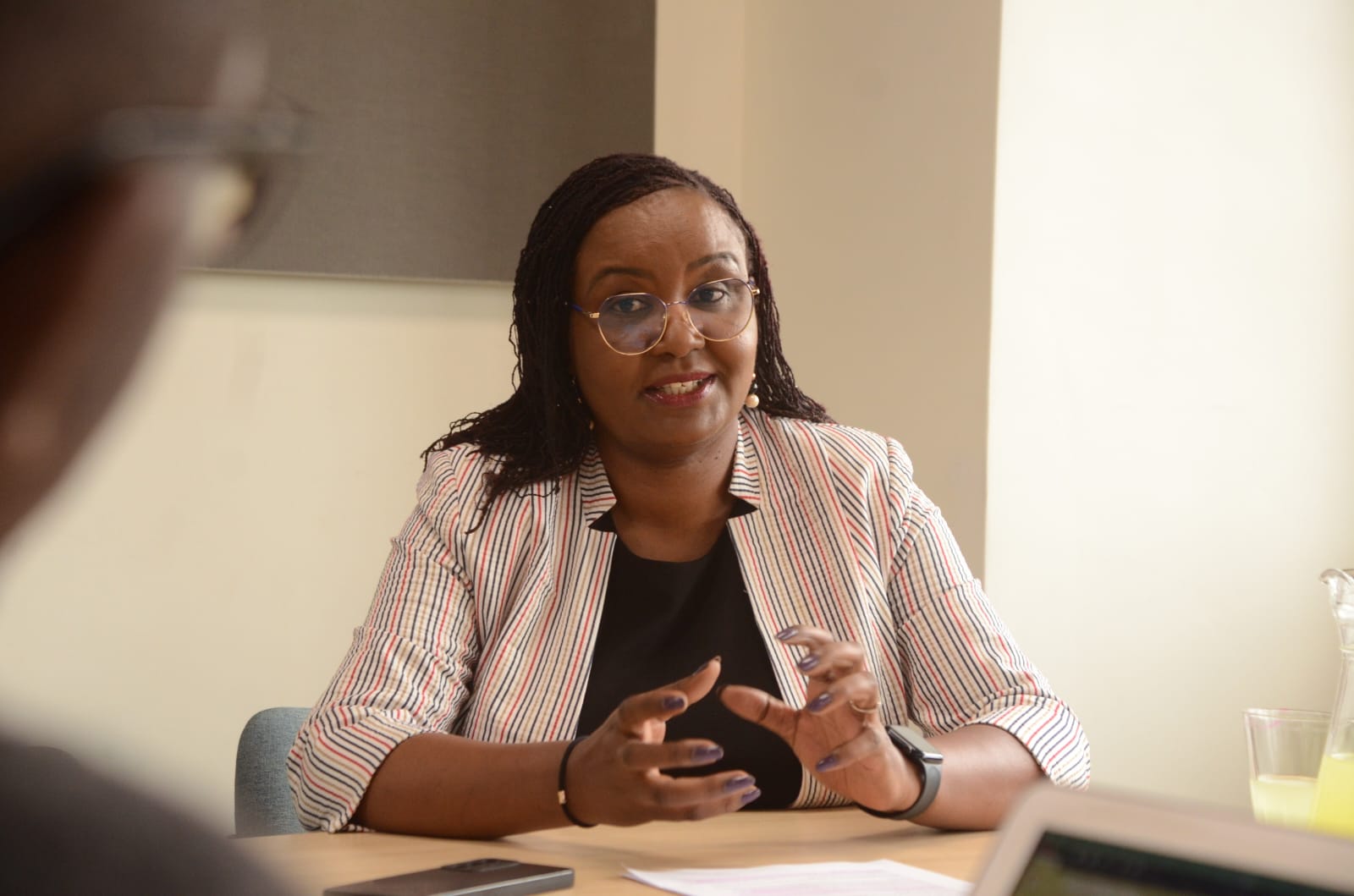
Dr Irene Mageto, an assistant professor and lecturer at the School of Nursing and Midwifery at the Aga Khan University in Nairobi. Photo/ DOUGLAS OKIDDY
Irene Mageto’s advice to Kenyans struggling to get into nursing school, is to not be ashamed to start anywhere. She began her nursing career with a basic certificate in early 1990s then later went back to school, and became the first nurse in Kenya to earn a PhD in Forensic Nursing. Dr Mageto is now an assistant professor and lecturer at the School of Nursing and Midwifery at the Aga Khan University in Nairobi.
She spoke with Star’s John
Muchangi.
What is the significance
of the International Nurses Week, that has just ended?
Nurses Week celebrates the work that nurses do every day. Our theme this year was "Our Nurses, Our Future: Caring for Nurses, Strengthening Economies." If we don't care for the caregivers, patient care suffers. We celebrate our work, but we also need to ensure that nurses themselves are supported.
Definitely the workload is heavy. From the Economic Survey 2025, we have 75,000 nurses in Kenya but various statistics indicate 20,000-30,000 of them are jobless, which means Kenya’s current working nurse-to-population ratio is too low. Is our problem insufficient training, unemployment or both?
The situation varies between public and private sectors. Many trained nurses remain unemployed due to limited resources and funding. So while we have trained enough, they are not being absorbed into the system. It's a mismatch.
Also, the demand
for nursing as a course is
very high, but the capacity in nursing schools is limited. We’re training large numbers at both
tertiary and university levels, especially in Nairobi where we have about eight
institutions. But retention is a challenge due to poor remuneration and unfavourable working conditions. In
clinical training, there's also a shortage of hospitals to accommodate
students. While private institutions may have facilities like simulation centres, others lack such
resources. So even though theoretical teaching is manageable, practical
training suffers.
Would you still advice young Kenyans to choose nursing as a career?
I would encourage them to join, but they should come in with an open mind.
Not all will be employed by hospitals. Some nurses start home care businesses
or work in other capacities beyond bedside care. Employment shouldn't be the
only goal.
How was the journey for you?
Personally I started at the lowest level, at certificate level. I didn't qualify to go to university straight because the cut-off point was very high at that time as we only had five public universities. I was in the first 8-4-4 class. The only private university was Baraton. My parents couldn't afford to send me there because of the finances, of course.
So I began at the certificate level with Enrolled Community Health Nursing, a two-and-a-half-year course, at Methodist training college. I worked in PCEA Kikuyu Hospital for a year and Kenyatta National Hospital for five years. In the meantime, I got married, then we moved to the US.
There, my training was evaluated and I qualified directly for a BSN (Bachelor of Science in Nursing) degree. I finished and returned to Kenya, did my Master's in Mental Health at the University of Nairobi, then pursued a PhD in Forensic Nursing. I taught at several universities including UoN and now work here at the Aga Khan University. It is possible to start from the bottom and rise to the top.
If I can just mention, here at the Aga Khan University’s school of nursing, I think 90 per cent of the teaching faculty have PhDs. And they started with Bachelor of Science in Nursing (BSN) or even lower.
 Hundreds of medics including nurses demonstrate as they head to the Parliament, Nairobi on April 9, 2024 /SCREENGRAB
Hundreds of medics including nurses demonstrate as they head to the Parliament, Nairobi on April 9, 2024 /SCREENGRABThe WHO’s State of the world's nursing report 2025 indicates job satisfaction is not necessarily better for nurses with advanced education. And also in Kenya, quite few Diploma nurses actually pursue degrees and few BSNs proceed to masters.
Initially, many pursued MSN (Master of Science in Nursing) to teach, but now others use it to enhance skills. For example, those with critical care training can lead in ICUs. Advanced practice nurses and midwives can diagnose, treat patients, prescribe treatment and, if need be, refer for higher management.
Specialisation allows nurses to work in targeted areas without teaching. University-level teaching requires at
least a Master’s, and for Master’s teaching, a PhD.
And training has become more flexible. At Aga Khan, students can attend classes only two days a week, making it easier to work and study. Most nurses cannot afford to stop working. Institutions should create nurse-friendly programmes that allow simultaneous work and study. It’s common in the West; we should do the same here.
What are other career paths apart from working in hospitals?
Nurses can venture into private practice, mental health, digital health,
forensic nursing, insurance, and teaching. I know nurses working in insurance
to evaluate cases and prevent fraud. They work closely with case managers and
play a key role in decision-making. I have written recommendations for several
nurses in this field. The opportunities are vast.
Are there certain areas of practice or study you would recommend to those seeking to specialise?
Mental health is critical and cuts across all specialities. We also have a shortage in midwifery and oncology. But I encourage nurses to follow their passion while also considering market demand.
What changes would you recommend to improve working conditions for
nurses?
Nurses need to be part of
decision-making processes. They should be involved in policy development. Also,
provide them with necessary resources and fair remuneration. When underpaid,
they seek opportunities abroad, which depletes our workforce. Create training
setups that allow career progression while working. We should strive to make
Kenya attractive for nurses to stay and grow professionally.
What systems exist or are lacking for mental health well-being of nurses?
Nurses face the same life challenges as anyone else, plus
the emotional toll of their work. Burnout is common due to heavy workloads,
lack of resources, and management support. Vicarious trauma (a normal emotional response to prolonged
exposure to other people's suffering) and compassion fatigue are real
issues. You see the humanity at its worst and at its best. So they also break
down.
There must be structured mental health support like debriefings after
traumatic events. Some hospitals like Aga Khan and KNH have such support systems, but many
others don’t.
How involved are nurses in policymaking and in deciding their scope of practice?
The Nursing Council of Kenya regulates our scope of practice, not the Kenya Practitioners and Dentists
Council. They NCK
defines what nurses at each level can do, from certificate to doctorate.
Nurses are increasingly involved in these processes.
But when it
comes to leadership, there is a big mismatch. I think we have
more PhD holders than any other healthcare speciality. Yet most leadership roles are often
given to doctors and other
cadres. Nurses have leadership training and can do an excellent job.
More nurses should be appointed to these roles.
 New nursing students at the Kenya Medical Training College.
New nursing students at the Kenya Medical Training College.
I think there is a widespread perception that nurses are junior to doctors.
Nurses are not doctor’s assistants. We have different scopes of practice, but we both care for the same patient. Doctors handle diagnosis and treatment, while nurses manage the outcomes. We should work as a team, respecting each profession’s boundaries. The way we see nursing in hospitals is maybe a doctor is here, a nurse is maybe working under that doctor. But maybe just to clarify, a nurse is not professionally below the doctor.
There have been those struggles in the health sector, but it helps to know what your scope is, and work within that scope. Competitions don't add any value to the patient care, or to the nurses and doctors themselves. The best thing is to work as a team, observe what your guidelines say, or your scope says, do your work and go home.
But nurses, at the end of the day, in capital letters,
they're not doctor's assistants. I think that's very important because I think that's the impression
that has been created, especially by doctors.
The 2025 Economic Survey indicates nearly 70 per cent of Kenyan nurses are female, why is that so?
Actually, nursing started as a female career. But the trend is changing. More
men are joining nursing programmes. The founder of modern nursing, Florence
Nightingale, was female, which may have influenced perceptions.
What is your final message to nurses in Kenya?
Nurses do a great job and deserve recognition. They must care for their mental and physical well-being. Practise mindfulness, exercise, eat healthily, and seek psychological support when needed.













![[PHOTOS] Ole Ntutu’s son weds in stylish red-themed wedding](/_next/image?url=https%3A%2F%2Fcdn.radioafrica.digital%2Fimage%2F2025%2F11%2Ff0a5154e-67fd-4594-9d5d-6196bf96ed79.jpeg&w=3840&q=100)



